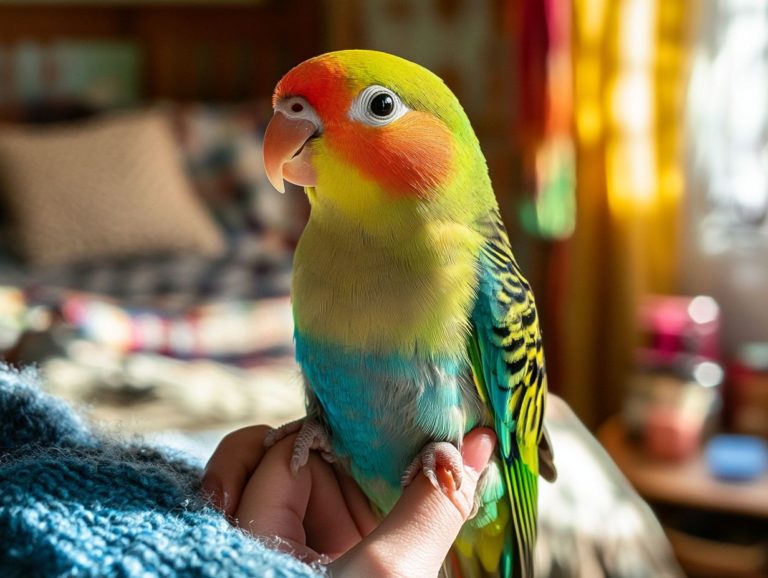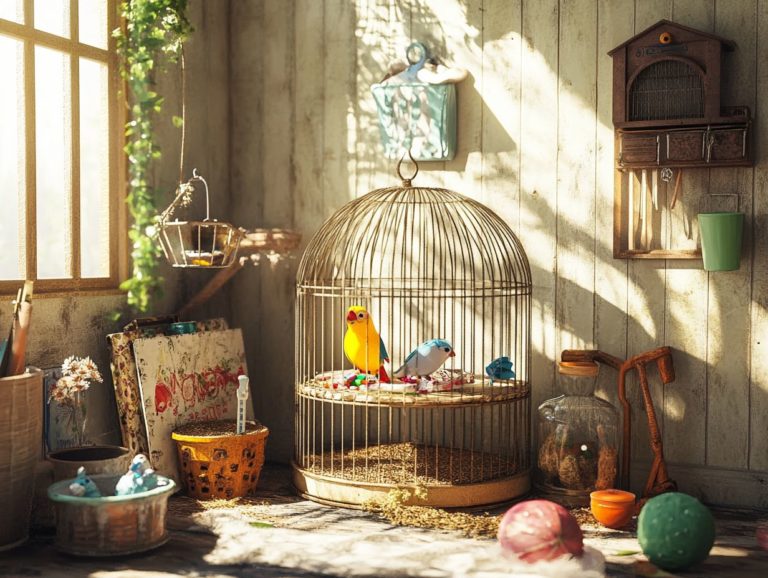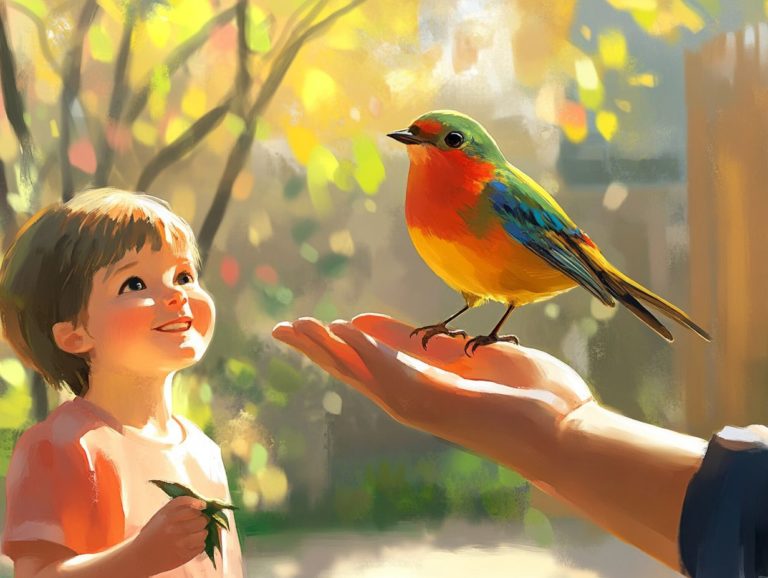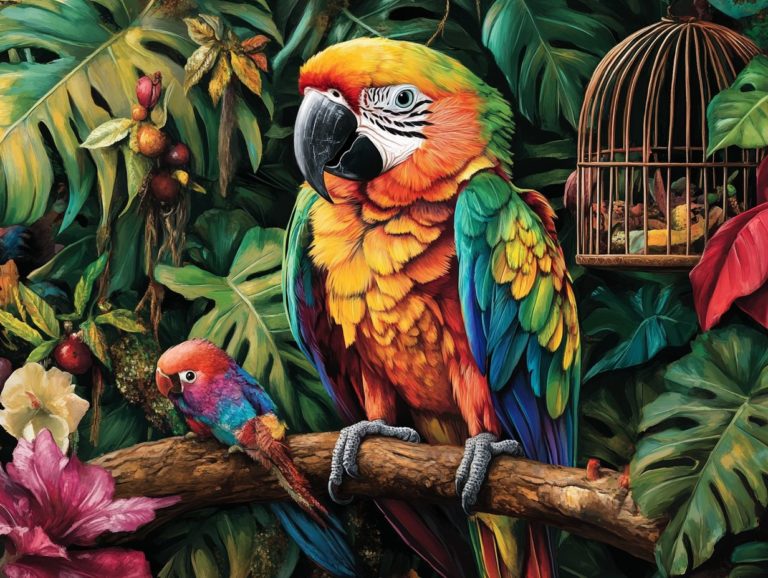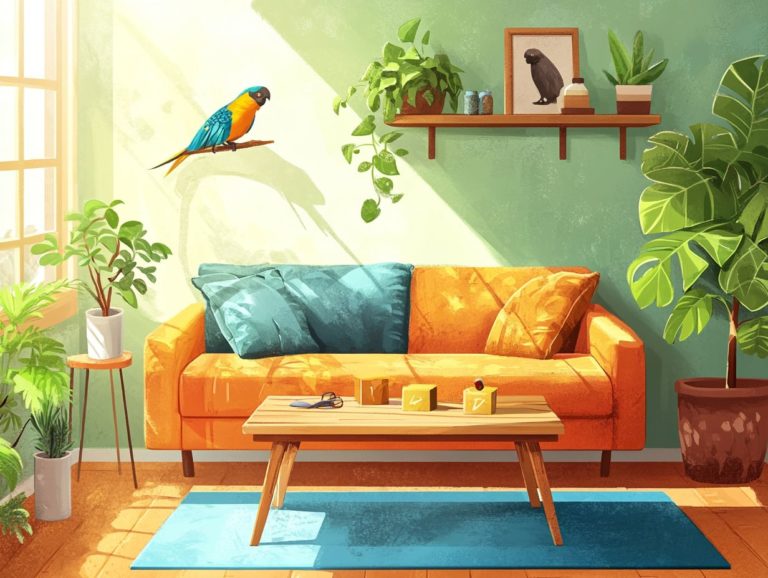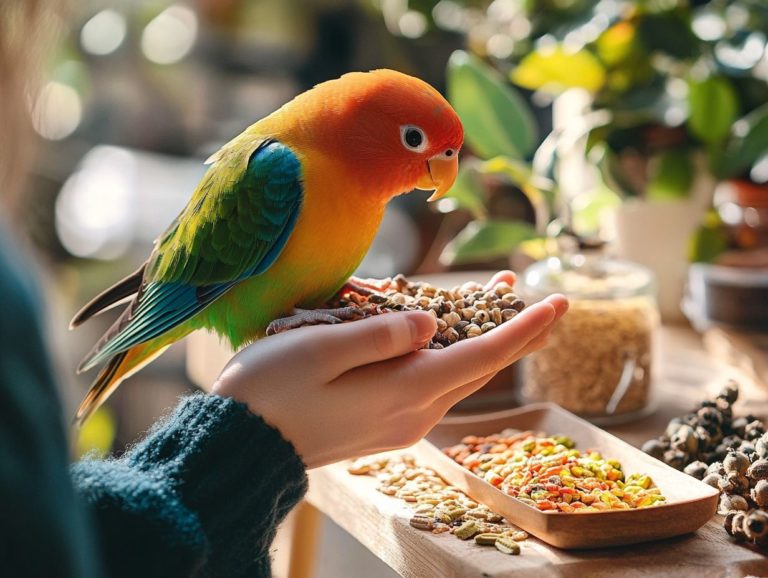How Do I Socialize My Bird Effectively?
Birds are inherently social creatures that flourish through interaction, both with their fellow feathered friends and with humans.
Recognizing your bird’s social needs is crucial for ensuring its well-being and happiness. This article delves into the significance of socialization and guides you through creating a safe environment that includes ample space and engaging toys. You will also learn how to establish trust through consistent routines and positive reinforcement.
You will also learn how to introduce your bird to others while addressing any aggressive or fearful behaviors. Uncover effective strategies for nurturing a well-adjusted and sociable avian companion, ensuring they thrive in their social world.
Contents
Key Takeaways:
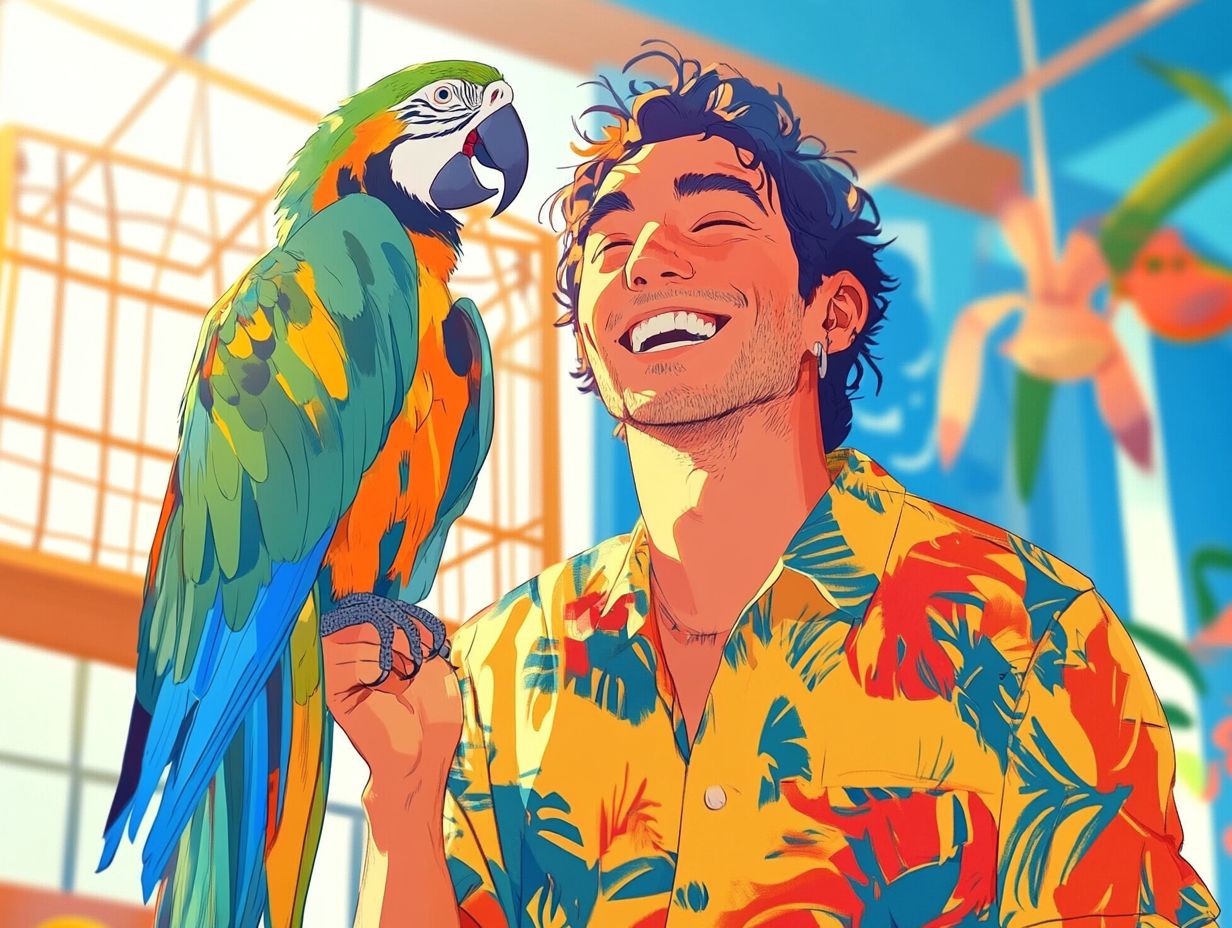
- Understand your bird’s social needs and the importance of socialization for its well-being.
- Create a safe and comfortable environment for your bird by providing enough space and toys.
- Build trust and bond with your bird by establishing a routine, using positive reinforcement, and teaching them to interact with both birds and humans.
Understanding Your Bird’s Social Needs
Understanding your bird s social needs is essential for nurturing a happy and well-adjusted pet. Birds, including baby parrots and Camelot Macaws, are naturally social creatures that thrive on interaction not just with their flock but also with you, their human companion.
Fostering proper socialization during their developmental phases can greatly enhance their emotional growth and significantly decrease the chance of problems with behavior. By acknowledging their need for social engagement, you can cultivate an environment that ensures a positive experience for your bird. Consider the best ways to bond with your bird through training sessions or friendly introductions to new faces.
Why Socialization is Important for Birds
Socialization plays a crucial role in your bird’s emotional development and trust in humans, helping to prevent potential problems with behavior.
By consistently engaging in positive interactions, you can cultivate an environment where your feathered friend feels secure and understood. When your bird is regularly exposed to various sounds, sights, and people, it becomes more adaptable and confident in its surroundings.
Employing training techniques like clicker training can further strengthen this bond, enabling your bird to associate sounds with rewards and, in turn, reinforcing its trust in you.
Bring your bird together with others to boost its social skills and confidence! Group interactions with other birds, whether in a safe environment or during supervised playdates, can enhance your bird’s social skills, reduce anxiety and aggression, and promote overall well-being.
Creating a Safe and Comfortable Environment
Creating a safe and comfortable environment for your bird is crucial for its overall well-being and development. Ensure the cage is spacious and filled with toys that foster playfulness and learning.
A thoughtfully structured environment offers safe opportunities for exploration and promotes the development of independence skills in your bird. When your feathered friend feels secure in its surroundings, it is more inclined to engage in socialization and build confidence.
Providing Adequate Space and Toys
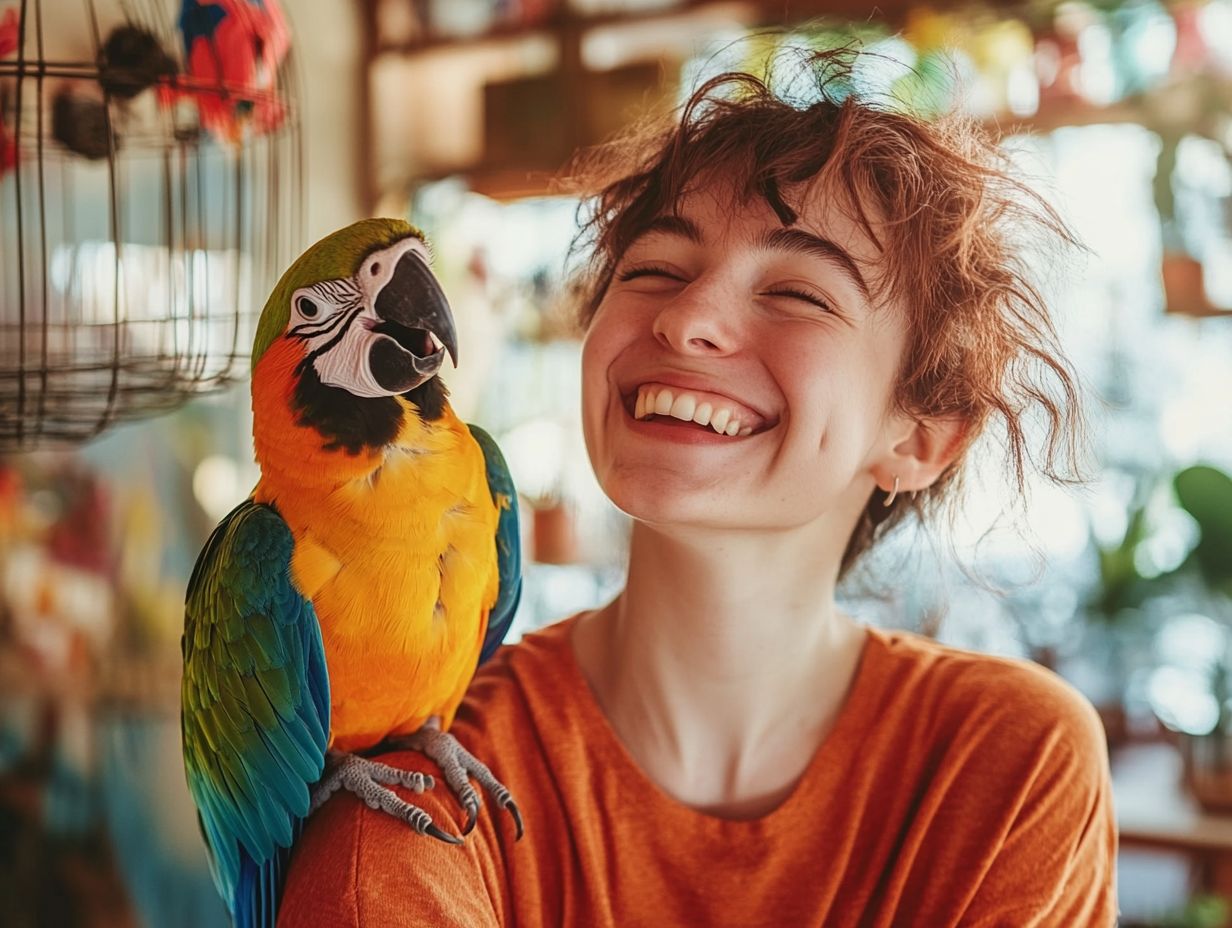
Providing ample space and a diverse selection of toys is essential for keeping your bird playful and engaged, significantly enhancing its emotional development.
A spacious environment allows your bird to move freely, exercise its wings, and explore its surroundings, all contributing to its overall well-being. When choosing the cage dimensions, aim for a minimum of 18 inches wide by 24 inches long for smaller species, while larger birds will thrive in even more generous accommodations.
Arranging perches at varying heights and incorporating climbing opportunities can create an environment that encourages natural behaviors. Including an array of toys such as foraging puzzles and swings creates safe avenues for social interaction. These toys not only stimulate your bird mentally but also promote physical activity, fostering a joyful and enriched life.
Have you tried any of these tips? Share your experiences or ask questions about bird socialization below!
Building Trust and Bonding with Your Bird
Building a bond with your bird is an exciting adventure that enhances the experience for both you and your feathered companion.
Techniques like hand feeding can forge a deep connection, allowing your bird to feel safe and secure in your presence.
Engaging in consistent training and gentle interactions will help you build trust an essential foundation for successful socialization and emotional well-being.
Establishing a Routine and Using Positive Reinforcement
Creating a routine and rewarding good behavior are crucial elements in training your bird effectively, leading to enhanced socialization and learning.
When you create a predictable schedule, you foster a sense of security for your feathery companion, allowing them to thrive in a stable environment.
Birds, much like humans, appreciate knowing what to expect throughout their day, which reduces stress and anxiety.
By using positive reinforcement techniques like offering treats or praise when your bird follows a cue you not only teach valuable tricks but also deepen the emotional bond you share.
Consistently rewarding desired behaviors encourages your feathered friend to engage and explore, turning training sessions into enjoyable interactions that build trust and enhance communication.
Introducing Your Bird to Other Birds
Introducing your bird to other birds is a pivotal step in its socialization journey, providing safe opportunities for interaction and helping it adapt to various social environments.
This process boosts your bird s confidence and teaches it the nuances of communication and relationship-building within its flock.
Careful introductions help avoid fear or aggression towards new birds.
Socializing with Humans
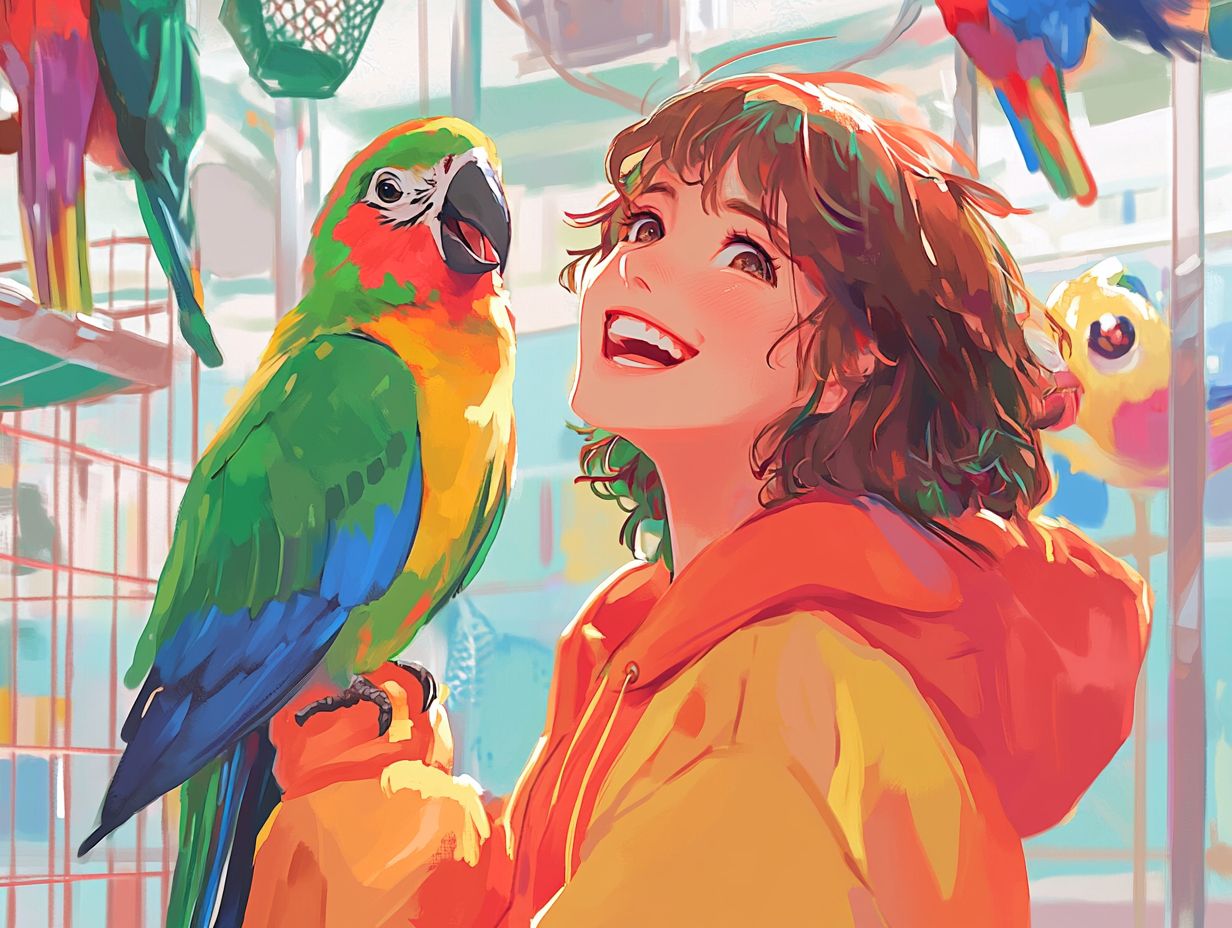
Socializing your bird is an essential part of its development, enabling it to interact confidently with new people and environments. Understanding the benefits of bird socialization can enhance both its well-being and your relationship with it.
By creating a routine where your bird meets a variety of individuals, you significantly enhance its comfort level and reduce any shyness.
Engaging in effective training during these interactions ensures a positive experience and encourages your bird to connect with humans more openly.
Teaching Your Bird to Interact with People
Teaching your bird to interact with you effectively requires a blend of patience and consistent positive experiences, such as feeding them their favorite treat, to foster trust and communication.
Incorporating enjoyable activities like offering their favorite treats creates an inviting environment where your bird feels motivated to engage with you.
Playtime is just as important; it serves as a bonding exercise, allowing for shared moments of joy and laughter.
As you encourage this interaction, pay close attention to your bird’s body language and vocalizations.
Recognizing signs of comfort, such as a relaxed posture and cheerful chirping, along with signs of discomfort like flapping or hiding, helps ensure your interactions remain positive and fulfilling for both you and your feathered companion.
Dealing with Aggressive or Fearful Behaviors
Tackling your bird’s fear or aggression is key for a happy home! Understanding the underlying causes of these behaviors allows you to address and correct them effectively, preventing further issues down the line.
With the right techniques and consistent training, you can guide your bird toward a more comfortable and confident presence in its surroundings.
Addressing and Correcting Negative Social Behaviors
Addressing and correcting negative social behaviors in your bird is essential for both its well-being and the quality of your relationship. Using training methods based on positive experiences enjoyable moments that encourage good behavior you can significantly enhance your bird’s social interactions and emotional health.
To effectively implement these strategies, the first step is to identify the specific triggers that lead to unwanted behavior. By carefully observing your bird’s responses in different situations, you can gain insight into what causes stress or aggression.
Creating a safe environment for your bird is equally vital. It s about providing a space where it feels secure and free from threats.
Consistency in training is crucial. Regularly reinforcing desirable behaviors with treats and praise helps build a positive association with social interactions. This paves the way for lasting improvements in behavior and facilitates gradual progression towards better social skills.
This approach not only fosters trust but also cultivates a deeper bond between you and your feathered companion. Your bird deserves a happy and healthy life!
Frequently Asked Questions
Here are some common questions about socializing your bird:
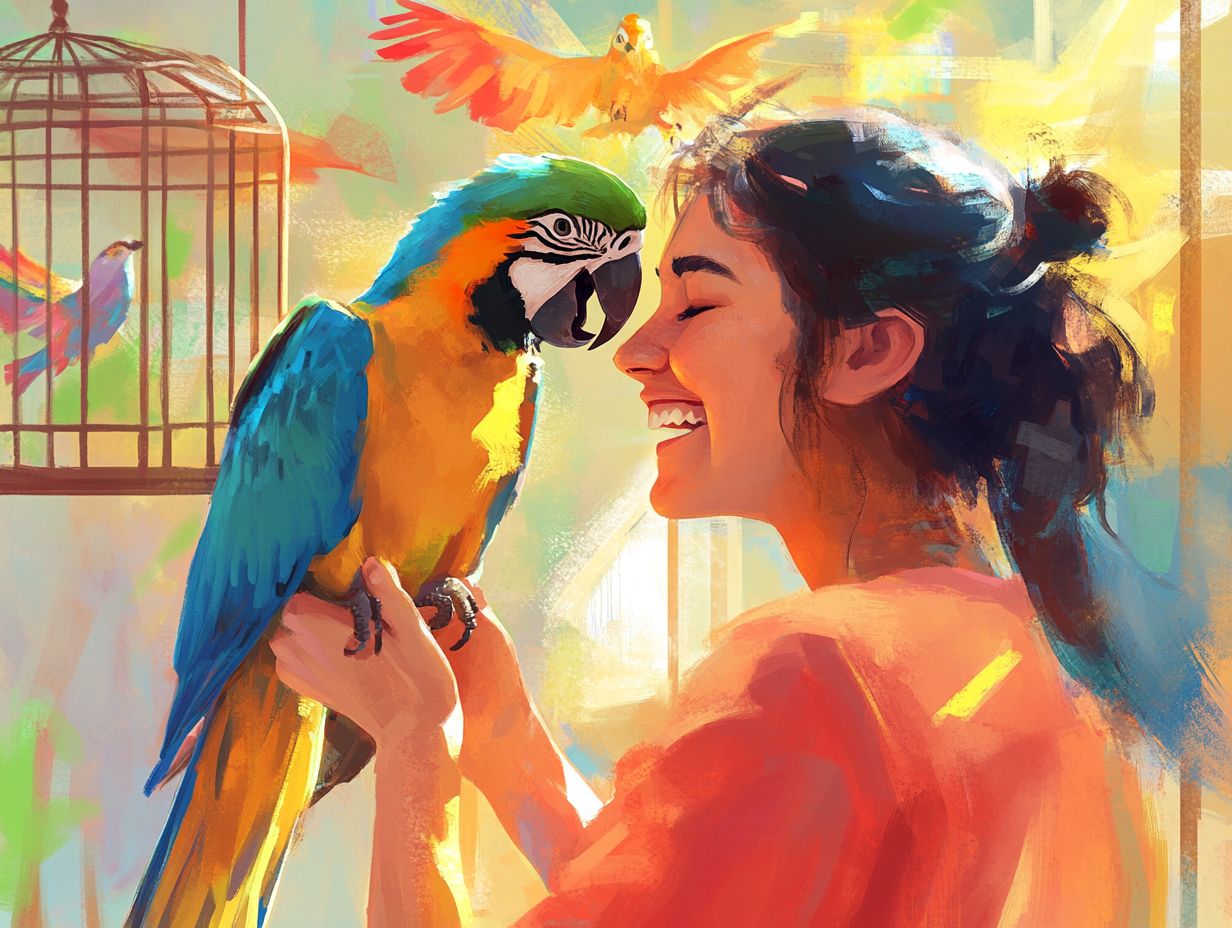
Socializing your bird effectively involves building trust and creating a positive environment. For best results, consider implementing socialization tips for newly adopted birds by providing opportunities for interaction and enrichment.
Socializing your bird is crucial for its overall well-being and happiness. Learning how to foster interaction with your bird helps develop important social and behavioral skills, prevents boredom and loneliness, and strengthens the bond between you and your bird.
Some effective ways to socialize your new bird include spending quality time with them, introducing new toys and activities, and providing opportunities for interaction with other birds and humans.
How do I build trust with my bird?
Building trust takes time and patience. Start by spending time near their cage, offering treats, and speaking in a calm and reassuring tone. Gradually handle and interact with your bird in a gentle and positive manner.
Yes! You can still socialize a shy or scared bird. Be patient and take things slow. Allow your bird to adjust to new experiences at its own pace. Offer positive reinforcement and be consistent in your interactions.
If your bird displays aggressive behavior during socialization, it is important to seek guidance from a professional bird behaviorist. They can help identify the underlying cause of the aggression and provide strategies for managing and modifying the behavior.
Start socializing your bird today!

